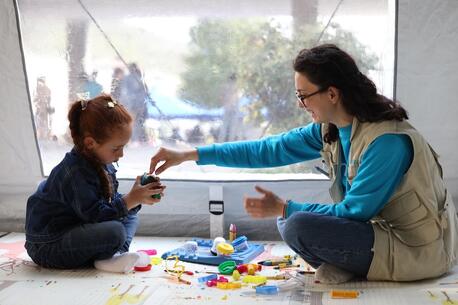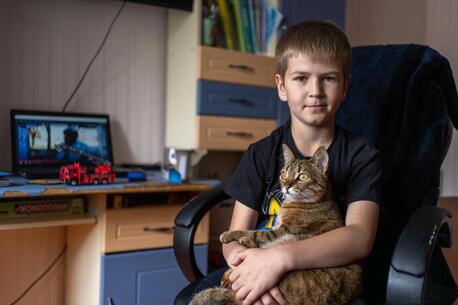
Training Helps Ecuador's Teachers Respond to Kids' Mental Health Needs
For Luis Carlos Anchico in Santo Domingo, Ecuador, the best part of being a teacher is connecting with his students. "You can get to know them, you can help them, you can be an emotional support, you can be a friend," he says.
School closures during the COVID-19 pandemic have made staying connected harder for students and teachers. Four out of ten students surveyed in Ecuador report feeling more anxious and stressed since the pandemic began.
To help bridge that gap, UNICEF and the Department of Student Counseling (DECE) provided technical training for 1,200 teachers in Ecuador on telephone psychological support. Teachers learn basic empathic listening techniques, how to provide emotional support and how to identify risky cases that require specialized attention. They also visit students at home when they need additional support.
Teachers are virtually checking in on students at home — watch this video:
"He asked me how I was, how was my grandmother, and how are we doing," says 11-year-old Brithany, a student who fell behind in her schoolwork after her grandmother became ill. "He also asked if I could do my homework. At school, they teach us better and I can see my teachers and my classmates, because I miss them a lot."
Teachers play a crucial role in the learning, mental health and well-being of their students. UNICEF is working around the world to support students and teachers and to help schools reopen safely. You can help.
Top photo: After 11-year-old Brithany fell behind in her schoolwork, her teacher, Luis Carlos Anchico, contacted her by phone and then followed up with a visit to her home in Santo Domingo, Ecuador. Anchico learned techniques for supporting children's mental health in a teacher training program supported by UNICEF and the Department of Student Counseling (DECE). © UNICEF/UN0490143/Kingman.Video edited by Tong Su for UNICEF USA.
HOW TO HELP
There are many ways to make a difference
War, famine, poverty, natural disasters — threats to the world's children keep coming. But UNICEF won't stop working to keep children healthy and safe.
UNICEF works in over 190 countries and territories — more places than any other children's organization. UNICEF has the world's largest humanitarian warehouse and, when disaster strikes, can get supplies almost anywhere within 72 hours. Constantly innovating, always advocating for a better world for children, UNICEF works to ensure that every child can grow up healthy, educated, protected and respected.
Would you like to help give all children the opportunity to reach their full potential? There are many ways to get involved.





